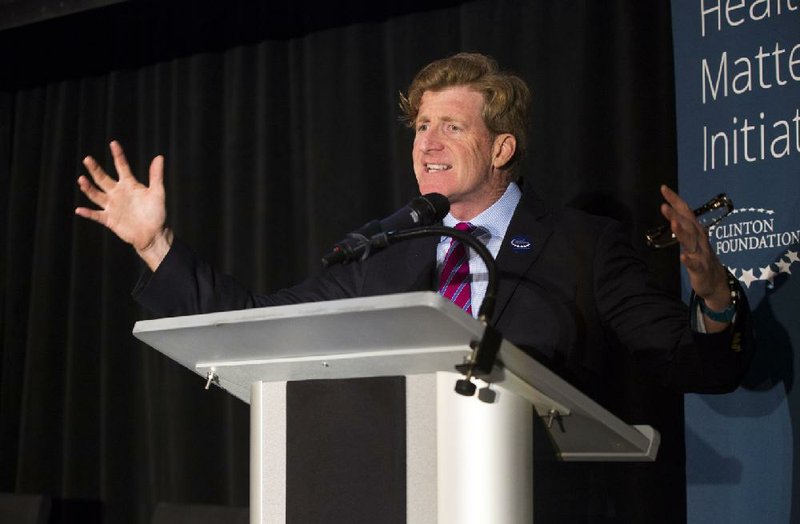In her heart, Julie Stampler carries a painful irony. In her purse, she carries naloxone.
Stampler, of New York City, suffered the loss of her brother, Jonathan, to a heroin overdose in 2003. The irony is that her stepfather, scientist Jack Fishman, developed the antidote to opioid overdose in the late 1960s.
“It’s insane to think naloxone has been around for so long and we’re just turning the corner with it now,” Stampler said after speaking to a town hall gathering on prescription drug abuse at the Clinton Presidential Center in Little Rock.
She asked the crowd of about 75 people to raise their hands if they had a fire extinguisher. Many hands went up.
We’re more likely to know someone who might have a drug overdose than have a fire, Stampler said.
“Don’t you think we should have naloxone in the house, just in case?” she asked.
Stampler’s two doses of naloxone — in a nasal spray, brand name Narcan — were in a small blue bag labeled “Drug Overdose Kit.” She said the medication was bought at a CVS pharmacy in New York for $144.
Rain Henderson, chief executive officer of the Clinton Health Matters Initiative, said the organization has worked for several years to make the supply of naloxone predictable and affordable. More companies are making the drug now, she said, and are “committed to public-interest pricing.”
Naloxone is available in Arkansas by prescription, said Dr. Michael Mancino, an associate professor in the Department of Psychology in the UAMS College of Medicine, although it’s carried by some police agencies around the state. He said state law protects those without specialized training who administer the medication.
Administering naloxone “will precipitate withdrawal in some people,” Mancino said. “It’s very uncomfortable, but in most situations is nonfatal.”
People in an unstable cardiac condition are most at risk, Mancino said, “but the benefits far outweigh the risks.”
Mancino said some states allow the dispensing of naloxone to anyone with a prescription for opioids. He said naloxone should also be made available to family members of people at high risk of overdosing.
“Oftentimes a person with an addiction doesn’t want to acknowledge the problem and may not be willing to accept the naloxone, so it might be important to have family members who have access.”
Jon Swanson, executive director of Metropolitan Emergency Medical Services, said the ambulance service has carried naloxone for years, and its use has increased along with an increase in overdose calls.
Spokesmen for the Little Rock Police Department, the Pulaski County sheriff’s office and the Arkansas State Police said their officers don’t carry naloxone. Bill Sadler of the state police said its commanders are abreast of the issue, but there was “no substantive internal discussion” that might lead to the use of the medication in the immediate future.
Patrick Kennedy, a former congressman from Rhode Island and son of the late Sen. Ted Kennedy, D-Mass., kicked off the meeting by recounting his 2006 traffic accident near the U.S. Capitol. The accident occurred late at night, he said, after he took several prescription medications. He left the scene, Kennedy said.
“I had no idea where my car was. I was waiting in terror for the phone call that said you finally killed someone.”
Kennedy said the accident caused him to become transparent about his bipolar disorder and his addiction problems. Invoking the federal Mental Health Parity Act, he said insurers must be held accountable to “pay for mental health treatment the way we pay for cancer treatment.”
“We may not overcome the stigma” of mental illness, he said, “but we can act on the discrimination. We can make sure insurance companies follow the law, and that includes the federal government.”
Mental illness and addiction can’t be separated, Kennedy said, and the latter has led to a stagnant life expectancy in the United States.
The Centers for Disease Control and Prevention reported in June that 157 Arkansans died in 2014 of prescription drug overdoses, compared with 15 in 2010.
Is the addiction problem in Arkansas now getting better or worse?
“Worse,” Mancino, the UAMS psychiatrist, said. “Because the amount of heroin available now has increased. As we’ve shut off the prescriptions, heroin has become more prevalent.”
Mancino said UAMS has a Center for Addiction Services and Treatment at(501) 526-8400.
“If you have an opioid problem, we’ll get you in the very next business day,” he said.
